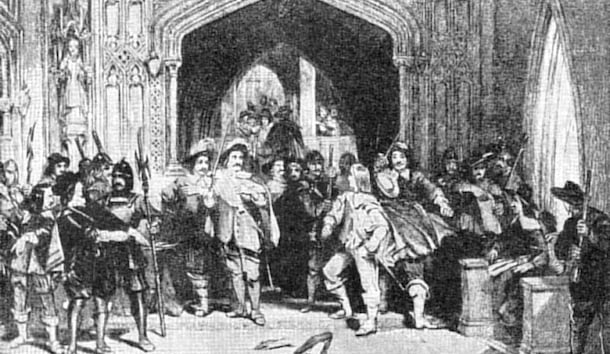“The name is Pride. Colonel Pride.” Out of the mists of English history a figure emerges whom we can recognize today. We would call him an “enforcer,” a man ordered to carry out a harsh policy determined by his superiors. In December 1648 Colonel Pride rid the Long Parliament of members unwanted by the Army rulers, Fairfax and Cromwell, Parliament then being owned by the Army. The Army wanted the blood of King Charles and had wearied of the repeated negotiations favored by those who wanted a deal with the monarch (the remote ancestors of today’s Remainers). Acting under orders, the colonel stationed Pride’s Regiment of Foot at the entrance to St Stephen’s Chapel, where the Commons met, and arrested 45 MPs. “Some Parliamentary time-server,” says Churchill scornfully, “had ticked off all those not likely to obey the Army’s will.” This discreditable event, known as Pride’s Purge, worked. The Army got their man in the following month, since the dissidents kept well out of the way and Parliament did not oppose the trial of King Charles.
We do it a more delicate way these days. Boris Johnson is threatening to block off undesirables in his New Conservative Party by denying them selection as Parliamentary candidates. Without the passport of the major party they have no chance—there are very few independent MPs at any time. As Peter Hitchens put it, “MPs are not elected. They are selected.” Curiously enough, this process was well established in Elizabethan times, as Shakespeare revealed when he smuggled their system into Coriolanus. J.E. Neale, whose The Elizabethan House of Commons is the authority, stresses that an election to the Elizabethans did not mean a choice between candidates; it was the confirmation of a candidate whom the governing circles had put forward. This is startlingly similar to today’s practice, in which some two-thirds of the seats in the House of Commons are regarded as “safe” and go to a candidate approved by H.Q. of whatever party. Conservative Central Office and local constituency parties are of one mind: we can have our purge the easy way. They cannot purge the existing Parliament, but they can readily shape the next Parliament, which is widely expected to be called soon. Cromwell would approve of Boris Johnson: if Parliament gets too recalcitrant, defying the executive, dilute the Parliament. The institution may look the same, but the people in it are different. In which case those eulogizing the supremacy of Parliament will have to change their tune.
So Boris will compel all Conservative candidates to swear a blood oath that they will accept his manifesto. And it will be in writing. Conservative Associations are in no mood to accept backslidings, and will not be trifled with. More, Downing Street is considering sanctions against those Tory MPs who tried to seize control of the Commons agenda this week. If they were deselected as Tory candidates, they would be replaced by others ready and able to vote the Party ticket. This is a showdown.
Will Boris succeed? The latest news is that the Rebels are in formidable force. The Commons debate (Tuesday night) ended in a defeat for the Government, by 328-301. That was on a motion that would wrest control of the business agenda from the Government and would defeat a No Deal. The Prime Minister immediately put forward a move for a snap general election. First though comes the critical motion tomorrow that would be in effect a vote of confidence in the Government. Some of today’s rebels will flinch at that prospect, even though they include such magnificos as Sir Nicholas Soames, grandson of Winston Churchill. The threat of deselection will weigh heavy on rebel minds.
I think there is a certain unreality about the political scene as presented. The Commons debate tonight was first-class TV theatre, a kind of Albert Hall prom concert for a large audience. It took place in the heart of metroland. Out there in the country, all indications are that people just want the Government to get on with it. The sensitivities of the political class are as nothing to plain folk who support Boris and his absolute deadline, Brexit on October 31. Meantime, the shade of Colonel Pride is not dissipated. We shall hear more of him and his heirs.

Leave a Reply